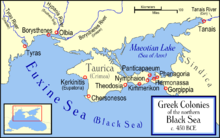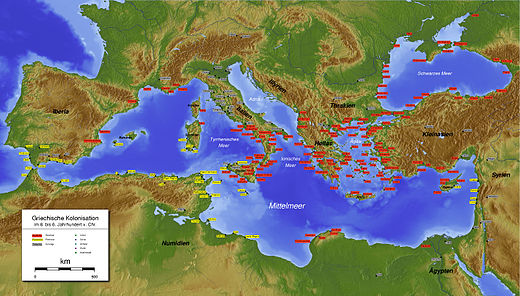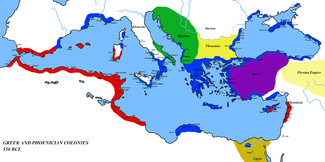- Colonies in antiquity
-
Colonies in antiquity were city-states founded from a mother-city—its "metropolis"[1]—, not from a territory-at-large. Bonds between a colony and its metropolis remained often close, and took specific forms.[2] However, unlike in the period of European colonialism during the Renaissance and the modern era, ancient colonies were usually sovereign and self-governing from their inception.
Contents
Egyptian colony
An Egyptian colony that was stationed in southern Canaan dates to slightly before the First Dynasty.[3] Narmer had Egyptian pottery produced in Canaan and exported back to Egypt,[4] from regions such as Arad, En Besor, Rafiah, and Tel ʿErani.[4] Shipbuilding was known to the Ancient Egyptians as early as 3000 BC, and perhaps earlier. The Archaeological Institute of America reports[5] that the earliest dated ship—75 feet long, dating to 3000 BC[6] – may have possibly belonged to Pharaoh Aha.[6]
Phoenician colonies
The Phoenicians were the major trading power in the Mediterranean in the early part of the first millennium BC. They had trading contacts in Egypt and Greece, and established colonies as far west as modern Spain, at Gadir (modern Cádiz). From Gadir they controlled access to the Atlantic Ocean and the trade routes to Britain. The most famous and successful of Phoenician colonies was Kart-Hadasht (Qart-ḥadašt, literally "New Town"), a colony founded from Tyre. It would eventually be known as Carthage.
Greek colonies
See also Category:Greek colonization
In Ancient Greece, colonies were sometimes founded by vanquished people, who left their homes to escape subjection at the hand of a foreign enemy; sometimes as a sequel to civil disorders, when the losers in internecine battles left to form a new city elsewhere; sometimes to get rid of surplus population, and thereby to avoid internal convulsions. But in most cases the motivation was to establish and facilitate relations of trade with foreign countries and further the wealth of the mother-city (in Greek, metropolis). Colonies were established in Ionia and Thrace as early as the 8th century BC.[7]
More than thirty Greek city-states had multiple colonies around the Mediterranean world, with the most active being Miletus, with ninety colonies stretching throughout the Mediterranean Sea, from the shores of the Black Sea and Anatolia (modern Turkey) in the east, to the southern coast of the Iberian Peninsula in the west, as well as several colonies on the northern coast of Africa with the overall sum[citation needed] being 1500 from the late ninth, up to the 5th century BC.
There were two similar types of colonies, ἀποικία - apoikia (pl.: ἀποικίαι, apoikiai) and ἐμπορία - emporia (pl.: ἐμπορίαι, emporiai). The first type of colonies were city-states on their own; the second were Greek trading-colonies.
The Greek city-states began establishing colonies around 800 BC, at first at Al Mina on the coast of Syria and the Greek emporium Pithekoussai at Ischia in the Bay of Naples, both established about 800 BC by Euboeans.[8]
Two flushes of new colonists set out from Greece at the transition between the "Dark Ages" and the start of the Archaic Period, one in the early 8th century BC and a second burst of the colonizing spirit in the 6th century. Population growth and cramped spaces at home seem an insufficient explanation, while the economical and political dynamics produced by the competitive spirit between the frequently kingless, newly introduced concept of the Greek city-states, striving to expand their sphere of economical influence better fits as their true incentive. Through this Greek expansion the use of coins flourished throughout the Mediterranean Basin.
 Ancient Greek colonies on the northern coast of the Black Sea, c. 450 BCE
Ancient Greek colonies on the northern coast of the Black Sea, c. 450 BCE
Influential Greek colonies in the western Mediterranean included Cyme (Aeolis), Rhegium (Rhegion) by Chalcis and Zankle (c. 8th century), Syracuse by Corinth/Tenea (c. 734 BC), Naxos by Chalkis (c. 734 BC), Massalia (what millennia later became Marseille, France) by Phokaia (c. 598 BC), Agathe by Phokaia (shortly after Massalia), Elea (Velia) by Phokaia and Massalia (c. 540 BC), Emporion (nowadays Spain) by Phokaia/Massalia (early 6th century), Antipolis (nowadays France) by Achaea, Alalia (Corsica) by Phokaia/Massalia (c. 545 BC) and Cyrene (North Africa) by Thera (762/61 and 632/31 BCE).[9]
Several formulae were generally adhered to on the solemn and sacred occasions when a new colony set forth. If a Greek city was sending out a colony, an oracle, especially one such as the Oracle of Delphi, was almost invariably consulted beforehand. Sometimes certain classes of citizens were called upon to take part in the enterprises; sometimes one son was chosen by lot from every house where there were several sons; and strangers expressing a desire to join were admitted. A person of distinction was selected to guide the emigrants and make the necessary arrangements. It was usual to honor these founders of colonies, after their death, as heroes. Some of the sacred fire was taken from the public hearth in the Prytaneum, from which the fire on the public hearth of the new city was kindled. And, just as each individual had his private shrines, so the new community maintained the worship of its chief domestic deities, the colony sending embassies and votive gifts to the mother-city's principal festivals for centuries afterwards.
The relation between colony and mother-city, known literally as the metropolis, was viewed as one of mutual affection. Any differences that arose were made up, if possible, by peaceful means, war being deemed excusable only in cases of extreme necessity. The charter of foundation contained general provisions for the arrangement of the affairs of the colony, and also some special enactments. The constitution of the mother-city was usually adopted by the colony, but the new city remained politically independent. If the colony sent out a fresh colony on its own account, the mother-city was generally consulted, or was at least requested to furnish a leader. Frequently the colonies declaring their commitment to the various metropolitic alliances formed in the Greek mainland and for religious reasons would pay tribute in religious centres, like Delphi, Olympia or Delos.[10] It is worth noting that the Peloponnesian War was in part a result of a dispute between Corinth and her colony of Corcyra (Corfu). The cleruchs, known in Greek as klêrouchoi, formed a special class of Greek colonists, being assigned individual plots of land in the place to which they had been assigned. The trade factories set up in foreign countries, such as Egypt, were somewhat different from the ordinary colonies, the members retaining the right of domicile in their own fatherland and confining themselves to their own quarter in the foreign city.
Roman colonies
Main article: Colonia (Roman)It was an old custom in ancient Italy to send out colonies for the purpose of securing new conquests. The Romans, having no standing army, used to plant bodies of their own citizens in conquered towns as a kind of garrison. These bodies would consist partly of Roman citizens, usually to the number of three hundred; partly of members of the Latin League, in larger numbers. The third part of the conquered territory was handed over to the settlers. The coloniae civium Romanorum (colonies of Roman citizens) were specially intended to secure the two seacoasts of Italy, and were hence called coloniae maritimae. The coloniae Latinae, of which there was a far greater number, served the same purpose for the mainland.
The duty of leading the colonists and founding the settlement was entrusted to a commission usually consisting of three members. These men continued to stand in the relation of patrons (patroni) to the colony after its foundation. The colonists entered the conquered city in military array, preceded by banners, and the foundation was celebrated with special solemnities. The coloniae were free from taxes, and had their own constitution, a copy of the Roman, electing from their own body their Senate and other officers of State. To this constitution the original inhabitants had to submit. The coloniae civium Romanorum retained Roman citizenship, and were free from military service, their position as outposts being regarded as an equivalent. The members of the coloniae Latinae served among the socii, the allies, and possessed the so-called ius Latinum or Latinitas. This secured to them the right of acquiring property, the concept of commercium, and the right of settlement in Rome, and under certain conditions the power of becoming Roman citizens; though in course of time these rights underwent many limitations.
From the time of the Gracchi the colonies lost their military character. Colonization came to be regarded as a means of providing for the poorest class of the Roman populace. After the time of Sulla it was adopted as a way of granting land to veteran soldiers. The right of founding colonies was taken away from the people by Julius Caesar, and passed into the hands of the Roman emperors, who used it mainly in the provinces for the exclusive purpose of establishing military settlements, partly with the old idea of securing conquered territory. It was only in exceptional cases that the provincial colonies enjoyed the immunity from taxation which was granted to those in Italy.
Most of this text is taken from Harry Thurston Peck's Harpers Dictionary of Classical Antiquities (1898) and needs to be rewritten and expanded.
Notes
- ^ see Metropolis for etymology
- ^ Ancient Greece: From Prehistoric to Hellenistic Times (Yale Nota Bene) by Professor Thomas R. Martin (Paperback - Aug 11, 2000),page 46,"... new location, colonists were expected to retain ties with their metropolis. A colony that sided with its metropolis's enemy in a war, for example was regarded as disloyal..."
- ^ Naomi Porat and Edwin van den Brink (editor), "An Egyptian Colony in Southern Palestine During the Late Predynastic to Early Dynastic", in The Nile Delta in Transition: 4th to 3rd Millennium BC (1992), pp. 433-440.
- ^ a b Naomi Porat, "Local Industry of Egyptian Pottery in Southern Palestine During the Early Bronze I Period," in Bulletin of the Egyptological, Seminar 8 (1986/1987), pp. 109-129. See also University College London web post, 2000.
- ^ Ward, Cheryl. "World's Oldest Planked Boats", in Archaeology (Volume 54, Number 3, May/June 2001). Archaeological Institute of America.
- ^ a b Schuster, Angela M.H. "This Old Boat", Dec. 11, 2000. Archaeological Institute of America.
- ^ The Oxford Classical Dictionary by Simon Hornblower and Antony Spawforth,ISBN 0198606419,page 1515,"From the 8th century BC the coast of Thrace was colonised by Greeks"
- ^ Robin Lane Fox examines the cultural connections made by Euboean adventurers in the 8th century in Travelling Heroes in the Epic Age of Homer, 2008.
- ^ A list of Greek colonies with individual articles.
- ^ "Ancient Greek colonies | 5.97 | Maria Daniels". Perseus.tufts.edu. http://www.perseus.tufts.edu/cl135/Students/Maria_Daniels/colonies.html. Retrieved 2009-05-05.
See also
- Classical demography
- Colonia (Roman)
- Magna Graecia
- List of ancient Thracian cities
- List of Illyrian cities
External links
- Map of Greek Colonies 9th-6th Centuries BC
- The Roman Law Library by Professor Yves Lassard and Alexandr Koptev
- Donald Kagan, Introduction to Ancient Greek History. 6. The Greek "Renaissance" - Colonization and Tyranny (Open Yale Courses)
Ancient Greece Periods Geography - Aegean Sea
- Hellespont
- Macedonia
- Sparta
- Athens
- Corinth
- Thebes
- Thermopylae
- Ionian Sea
- Ionia
- Aeolis
- Doris
- Antioch
- Alexandria
- Pergamon
- Miletus
- Ephesus
- Delphi
- Delos
- Olympia
- Troy
- Rhodes
- Crete
- Peloponnesus
- Epirus
- Cyprus
- Pontus
- Magna Graecia
- Ancient Greek Colonies
Politics Rulers - Kings of Sparta
- Kings of Athens
- Archons of Athens
- Kings of Macedon
- Kings of Pontus
- Kings of Paionia
- Roman Emperors
- Kings of Kommagene
- Kings of Lydia
- Attalid Kings of Pergamon
- Diadochi
- Kings of Argos
- Tyrants of Syracuse
Life - Agriculture
- Clothing
- Cuisine
- Democracy
- Economy
- Education
- Festivals
- Homosexuality
- Law
- Marriage
- Mourning ritual
- Olympic Games
- Pederasty
- Philosophy
- Prostitution
- Religion
- Slavery
- Warfare
- Wine
Military - Wars
- Army of Macedon
- Antigonid Macedonian army
- Pezhetairoi
- Hoplite
- Seleucid army
- Hellenistic armies
- Phalanx formation
- Peltast
- Sarissa
- Xyston
- Sacred Band of Thebes
People OthersGroups- Playwrights
- Poets
- Philosophers
- Tyrants
- Mythological figures
CulturesBuildings Arts Sciences Language Writing Lists - Cities in Epirus
- Theatres
- Cities
- Place names
Categories:- Colonies in antiquity
- Greek colonization
- History of colonialism
- Roman law
- Foreign relations of Ancient Rome
- Ancient Greece
- Hellenistic generals
Wikimedia Foundation. 2010.


